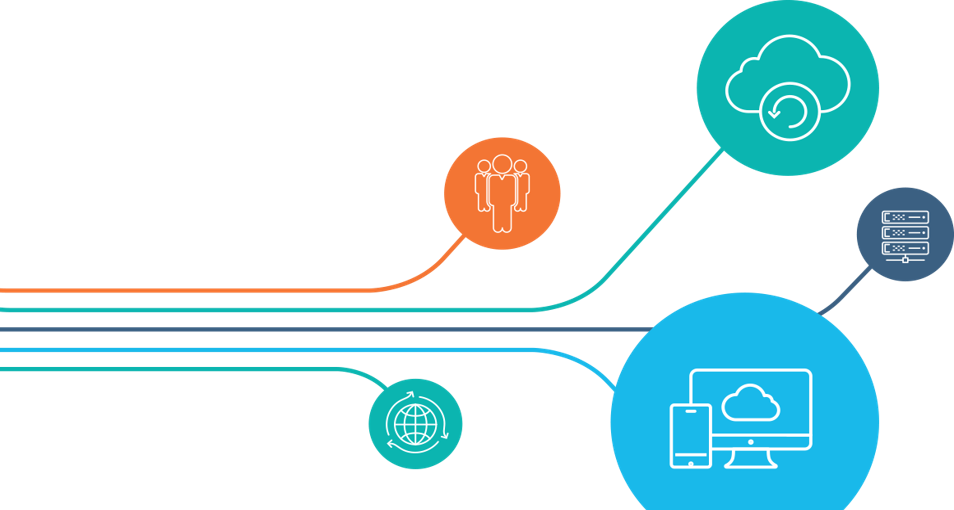Office 365 Tenant Migrations: Best Practices is a three-part series on Bits & Bytes featuring expert advice from Nero Blanco, an IT service provider in the UK specialising in end-to-end migrations. Part II of that series is available here.
Given the growth of Microsoft Office 365, tenant-to-tenant migrations were inevitable and have become more and more frequent. Tenant-to-tenant migrations have essentially become the new Exchange and AD migrations we all know and love from the last 15 years.
That said, whilst the tenant migration has become necessary, unless you are a born in the Cloud organisations, you will almost certainly have some on-premises work to do as well. This will be in the Active Directory space for sure, and may involve migrating Users & Computers, Applications, GPOs and other resources. The internal non-IT work is not trivial so the whole project wrapper needs to be properly transitioned, change has to be managed effectively. The Prosci ADKAR model has gained a lot of momentum in recent times and perhaps should be factored into the overall project.
So, whilst T2T is front and centre, it’s certainly not the end of the story for many organisations.
So Why Are Organizations Migrating Between Office 365 Tenants?
Well, nothing has changed much from pure business point of view right? Businesses are still growing and acquiring / merging. Some businesses are being broken up due to a divestiture, broken away or spun-off. Perhaps regulatory requirements have enforced a split.
Here are a few of the main reasons we have seen:
- Mergers / Consolidation
- Acquisitions
- Divestitures
- Spin-Offs
- Geography-driven decisions to meet data residency requirements
- Although Microsoft does now offer multi-geo tenants, this is available only to customers with a minimum of 2,500 Office 365 seats.
- Regulatory / Compliance
- Rebranding
- Rename of the Tenant
- Again, Microsoft does have some support around this now and will consider it by special request
- Migrate from a Test / Dev to Production
Whatever the reason, tenant-to-tenant migrations require a considerable understanding of what you will and will not get from Microsoft in terms of assistance, 3rd party tools capabilities and of course IT Consulting Services from trusted professionals to bring this all together. That’s where Nero Blanco comes in. We can help transition you through the whole process whilst keeping your end users productive.
Migration Tools: What Are Your Options?
Microsoft
You would think that with all these never-ending corporate mergers and takeovers in the business world that Microsoft would have a ready-made solution for consolidations of their own IT platform – especially a platform where they have been very strict about connected client versions, configurations and third-party connectivity.
In September last year (2018) we became aware of the Exchange Online Cross-Tenant Mailbox Move Preview Program:
The Exchange Online Cross-Tenant Mailbox Move Preview Program is designed to validate new features in Exchange Online by having customers test migration scenarios using pre-release features in Exchange Online. The program gives participants the opportunity to provide feedback to the Exchange product development team.
So not strictly designed as a tenant migration tool, more of a ‘test new features tool’. It’s not available to everyone on General Availability and even so, it only concerns itself with Mailboxes, which is only one piece of the Office 365 puzzle – and quite frankly that is the low hanging fruit. Exchange mailbox migrations are quite straight forward. When you consider all that has to be done, you can quickly discount this as anything useful.
Now, we’re sure that with enough heavy hitters in this space Microsoft will perhaps relent and provide tooling for their biggest and best customers but given the rate of change in Office 365 and the roll out of new workloads to the service, it would require a lot of maintenance. It took a long time for Microsoft to bring Exchange Migrations to the product via PowerShell New-MoveRequest. And, is there really a good AD Migration tool from Microsoft? ADMT anyone?
So personally, I’m guessing that a Microsoft inspired tenant-to-tenant tool may be a long time coming. And as for Coexistence… well, more about that later.
3rd Party Migration Tools
With a technology gap to fill, the free market always delivers. A number of vendors have now inevitably provided a solution to the problem.
You need to decide what features and functionality are important to you, because we have seen that whilst many vendors are operating in this space, they all have their strong suits and their weaknesses. Very few tools for example migrate SharePoint versions. One vendor explained that the performance hit on the tool was too great and outweighed the genuine needs and request of customers.
We personally love MigrationWiz by BitTitan. We’ve been doing migrations with BitTitan for some years now. We like the simplicity of the interface. It’s cloud-based so we don’t need to stand any kit up. The migration throughput is second to none. Their support is absolutely first class as is their documentation and knowledgebase articles.
Using Quality Consultants
However fast and reliable a migration toolset is, it is only one part of the puzzle. The overarching steps to complete the migration requires a whole lot more. Business buy-in, scheduling, planning, project management, transition management all has to be factored in. Pretty much all players in the IT department will have some input.
If you are merging organisations there is for sure going to be some political hurdles that may slow your project down. There will be timings for public announcements rebranding and pretty much all the usual soft skills required at the business and corporate governance levels.
This is where good consultants who know this process come in to play and can provide proper planning and understanding to the project for the key stakeholders and ultimately the end users.
Downtime
 In all scenarios you must accept that there will be some downtime, however small. Our advice: Accept a level of pain. Hoping for a zero user-impact migration is just not possible. Good consultants can minimise this with solid preparation and efficient cutover delivery.
In all scenarios you must accept that there will be some downtime, however small. Our advice: Accept a level of pain. Hoping for a zero user-impact migration is just not possible. Good consultants can minimise this with solid preparation and efficient cutover delivery.
Where a SMTP domain is being taken over (as part of a cutover migration) then there comes a time when you must stop the mail flow and cut-over the DNS records. Even if your MX records are pointing to an appliance that can pause mail flow and hold incoming mail, it is still not reaching your end users.
In certain acquisition scenarios this may be moot of course, as the acquiring company may not care about the old branding, in which case the legacy tenant can have the forwarding enabled.
A merger / acquisition where the SMTP Domain name is being moved is going to be more complicated. Re-creating any mail rules, DNS configurations for MX, DKIM, DMARC, SPF, Organisation sharing, will all take time and are directly affected by the tenant being available.
For further reading on DNS, check out these links:
- DomainKeys Identified Mail (DKIM)
- Domain-based Message Authentication, Reporting & Conformance (DMARC)
- Sender Protection Framework (SPF)
Removing all traces of a Domain name from the source tenant can take some time to complete as well as then re-populating objects in the target with the correct UPNs, Primary SMTP Addresses, and proxyAddresses.
In a coexisted world, there may be no downtime for mail. However, that is possibly the least of the worries in that scenario! Those users still need to recreate the Outlook and OneDrive profiles.
To do this, users must re-create their Outlook and OneDrive profiles either on the workstations or mobile devices. In some situation’s users may even have to be advised of their new username and password through an appropriate mechanism, hopefully in advance.
The amount of downtime or outages will be proportionate to the size of the organisation and the workloads, and particularly the type of migration.
Communication, Helpdesk, and Documentation
Communicating in advance in clear details to your end users is crucial to stave off calls.
Ensuring the Helpdesk and Support Professionals are completely engaged and across the project is vitality important. Documentation will inevitably need to be updated as soon as is practical.
At BitTitan we’ve been empowering IT service professionals to successfully deploy and manage cloud technologies through automation for over a decade. Sign up for a FREE BitTitan account today to access our products and services.


